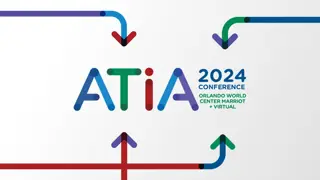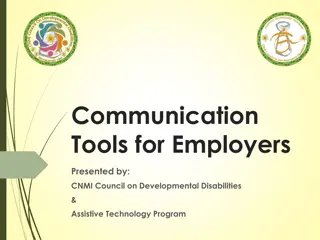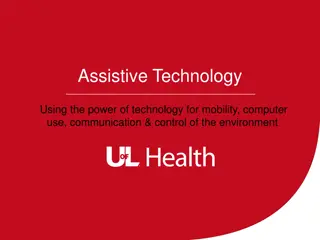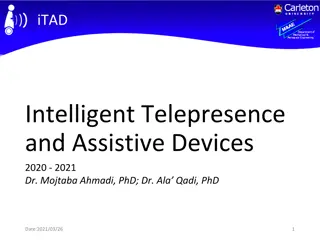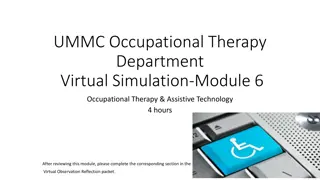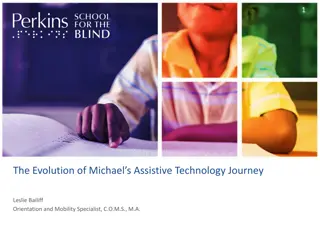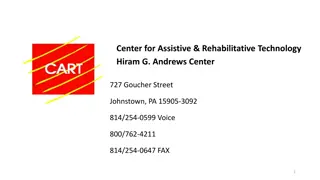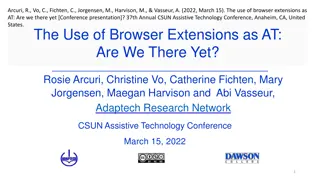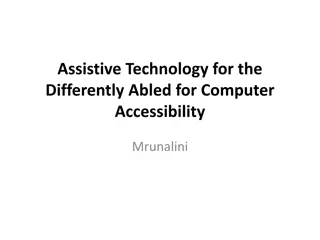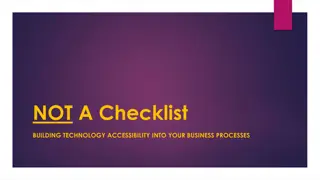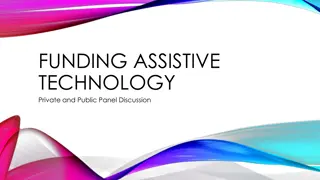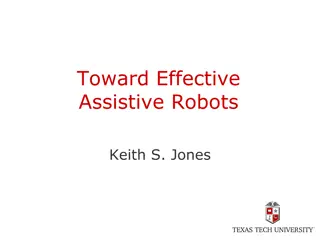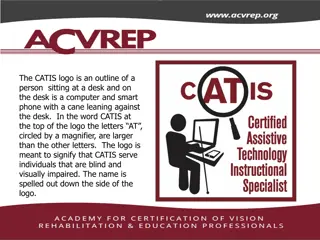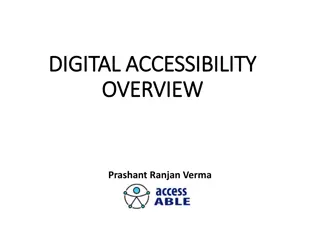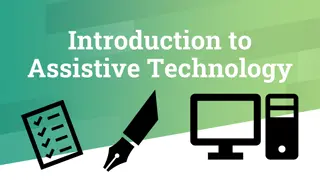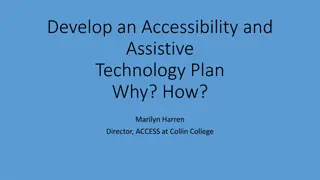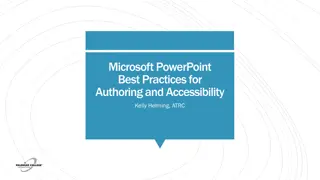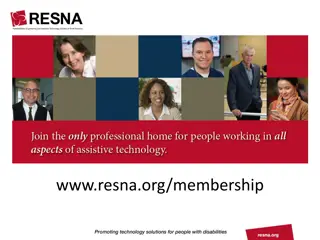
Assistive Design for Inclusive Accessibility
Enhance understanding of assistive technologies and inclusive design principles for accessibility in various formats. Explore tools like text readers, screen readers, and software optimizations for improved user experiences. Consider the importance of accessible text, graphics, and presentation layouts. Discover strategies for creating inclusive digital content and promoting equitable usability. Prioritize accessibility features to ensure information is perceivable, operable, and understandable for all users, including those with disabilities.
Download Presentation

Please find below an Image/Link to download the presentation.
The content on the website is provided AS IS for your information and personal use only. It may not be sold, licensed, or shared on other websites without obtaining consent from the author. If you encounter any issues during the download, it is possible that the publisher has removed the file from their server.
You are allowed to download the files provided on this website for personal or commercial use, subject to the condition that they are used lawfully. All files are the property of their respective owners.
The content on the website is provided AS IS for your information and personal use only. It may not be sold, licensed, or shared on other websites without obtaining consent from the author.
E N D
Presentation Transcript
Approximately 56.7 million people are considered to have a severe disability. Only 15 million people use a mobility device, such as a wheelchair, cane, crutches, or walkers. 41 million of the people defined as having a severe disability do not use a mobility (visible) device. You can t always see who has a disability and who does not.
Email Signature ALT Text Pictures Color Contrast Reading Order Closed Captioned Universal Design Universal Design Instruction
1. Equitable use 2. Flexible in use 3. Simple and intuitive 4. Perceptible information 5. Tolerance for errors 6. Low physical effort 7. Size and space for approach and use 8. A community of learners 9. Instructional climate
Text reader (Claro Read/Read & Write) Screen Reader (JAWS - Job Access Work System) Dictation Software (Dragon) Inspiration (Mind Mapping) Zoom Text (Text Enlarger) Sonocent (Audio Note Taker) Adobe Acrobat YouTube (Caption) My Math (Math Jaxs) Adobe Reader XL Microsoft Word/Power Point PDF
Text is readable [font (Arial, Calibri, Verdana) color, size (18pt-22pt) and clarity] Text is navigable (headings, also called Styles ) Text is formatted clearly (spacing, columns, section breaks, and text box) Text is meaningful (acronyms explained, clear hyperlinks) Graphics are fully described (alternative text) Tables are clear and simple (descriptions, heading row) Check accessibility (file, information, and check for issues) AMAC PRESENTATION 2016
Design and formatting Slide titles are unique Reading order (Important information first) Accessible text for screen reading software Graphics are fully described AMAC PRESENTATION 2016
Background place text on a solid background not over an image Layout use a standard layout template with text place holders Color contrast between your font and background https://www.paciellogroup.com/resources/contrastanalyser/ http://webaim.org/resources/contrastchecker/ AMAC PRESENTATION 2016
Each title should have a unique title This helps clarify your presentation and organize your ideas Helps your audience focus AMAC PRESENTATION 2016
Click Home tab In the Drawing section, Select Arrange In the Arrange drop down, Select Panel AMAC PRESENTATION 2016
Text style (Arial, Calibri, Verdana) Size (Title 40pt, Text 22pt) Please do not add your own text box AMAC PRESENTATION 2016
Words are powerful and they can hurt! People First Language is about respect, dignity, and putting the person first, not the condition. Mark Twain said The difference between the right word and the almost right word is the difference between lightening and the lightening bug.
USE Person with Down Syndrome Congenital disability Speech or communication delay Person without disabilities/ typical person AVOID The Down s person Birth defect Tongued tied Normal/ healthy/ able-bodied
https://support.office.com/en-us/article/Use-the- Accessibility-Checker-on-your-Windows-desktop-to-find- accessibility-issues-a16f6de0-2f39-4a2b-8bd8- 5ad801426c7f https://support.office.com/en-us/article/Accessibility-video- training-71572a1d-5656-4e01-8fce-53e35c3caaf4?ui=en- US&rs=en-US&ad=US
PTI Universal Design strand 2016 AMAC Presentation 2016 https://www.paciellogroup.com/resources/contrastanalyser/ http://webaim.org/resources/contrastchecker/
Https://www.youtube.com/watch?v=eks3r-nE9lU Watch first 6 min

